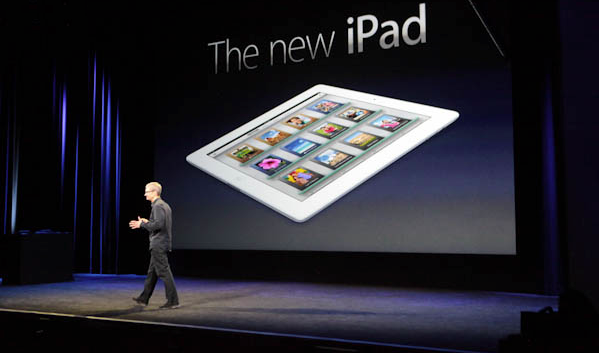The 'next iPad': Is Apple running out of ideas?

It has been less than a week since Apple announced the new iPad. Already speculation has begun as to what the next-generation iPhone will be called --- probably "the new iPhone" --- and what the smartphone will offer.

The next iPhone will be easy for Apple. A lot of what we expect today will be what will go into the device.
Slap in 4G LTE capabilities, beef up the battery if possible, and update the operating system to iOS 6, and include some funky new software technologies. Seeing as iWallet could be a reality, NFC-enabled payments are likely, and the usual incremental processor and memory increases are likely. Apple could redesign the shell and casing if there isn't enough that can go into physically inside it.
The next iPad, however, will be Apple's greatest headache. What could possibly be next, with technologies that must be available now or in use enough in a year's time for when the next iPad is ready for launch?
Y Combinator founder Paul Graham thinks Apple's creative innovation stemmed from the late Steve Jobs himself. Via Business Insider:
"I was talking recently to someone who knew Apple well, and I asked him if the people now running the company would be able to keep creating new things the way Apple had under Steve Jobs. His answer was simply "no." I already feared that would be the answer. I asked more to see how he'd qualify it.
But he didn't qualify it at all. No, there will be no more great new stuff beyond whatever's currently in the pipeline. Apple's revenues may continue to rise for a long time, but as Microsoft shows, revenue is a lagging indicator in the technology business."
But it's not about what Apple wants to give us. It's about what will subdue the growling underbelly of the consumer market.
The iPhone and iPad play technological cat and mouse. Each device passes the baton to the next iteration of its sibling counterpart. Bring the Retina display to the iPhone, and next it comes to the iPad. 4G LTE arrived in the iPad first as it holds a better battery life, while the next iPhone will likely follow suit. Rinse and repeat.
Apple could hit a roadblock if it cannot find enough innovation to wedge into the next iPad. If Apple does suffer a lack of innovation, could this iPad be the last one for a while? The company keeps its year-long record of announcing a new iPhone or iPad, but breaking consistency from hereon it would signal the company's difficulties.
Sir Jonathan Ive, Apple's design chief, in a rare interview discussed the process of how a new product comes about. Speaking to London's Evening Standard, he said:
"What I love about the creative process, and this may sound naive, is this idea that one day there is no idea, and no solution, but then the next day there is an idea."
"Our goals are very simple --- to design and make better products. If we can’t make something that is better, we won’t do it."
And there we have it: Apple's "get-out" clause. If it can't innovate, it won't innovate.
The next big thing to look out for is Apple's long-awaited iTV, which is expected to be a fully-fledged television rather than the Apple TV set-top box that the company currently purveys. The company may struggle to innovate, but if it breaks into an already-established market with a product of its own, there is all but no doubt that consumers will jump for the Apple-branded product anyway.
The iPhone 4S was "disappointing" in the eyes of analysts, yet went on to achieve record sales with 4 million sales in the first weekend alone. The new iPad went a similar way but with a warmer reception, as it sold out within days of its announcement and pushed back shipping dates by three or four days.
Apple receives 76 percent of its revenue from iOS devices, including the iPhone, the iPad and its lesser-bought sibling, the iPod touch. For Apple to maintain its $500 a share value and remain a global dominating force in consumer computing and electronics, it has to hold onto its iOS revenue stream for as long as it can.
Apple, simply put, cannot afford to fail to innovate with the next iPad.
Image source: CNET.
Related:
- Apple sold more iOS devices in 2011 than it sold Macs in 28 years
- Analysts' 'disappointing' iPhone 4S could be fastest selling to date
- Apple 'does an iPhone 4S' with new iPad: Disappointed?
- Apple wins patent for e-wallet
- James Kendrick: Why I will buy a new iPad
- Webcast: ZDNet analysis of the new Apple iPad announcement
- All ZDNet coverage of Apple’s iPad